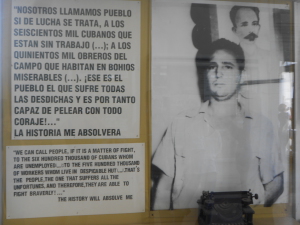The Cuba created by Fidel Castro at gun point, with the help of a network of informers, dozens of patriotic slogans, marches to strengthen the revolutionary spirit, rationing and hollow successes (passed off to the international public as precious jewels) is holding on despite the demise of its chief administrator.

Apart from the hired mourners, the Pharaoh-style funeral, cautious rejoicing of the people in the island and exuberant celebrations of the Cubans living in exile, Fidel Castro’s death has not had any impact on the everyday life in Cuba. The way of life, shaped by everyday hardships and controlled by fear in all its forms, has not improved at all. Quite the opposite: the misery seems to be striking even harder and the repression against objectors involved in dissident activities has been on the increase.
So far, no formula has been found that could stop the destructive capacity of the system, which is currently approaching the 58th anniversary of its existence. But it’s not only that. The arbitrary and ruthless conduct of the Political Police along with the inability of citizens longing for a change to organize a consensus make it effectively impossible to create an opposition movement. As if this wasn’t enough, the policy on one of the longest lasting dictatorships in contemporary history pursued by the world seems to be that of peaceful coexistence.
Just remember how the European Union lifted its common position on Cuba, think of the normalization of relations between the EU and the Communist government, Raúl Castro’s attendance at the last Summit of the Americas, Cuba’s re-election to the Human Rights Council, open support from the Vatican or the tribute paid to the deceased leader by the United Nations General Assembly.
Further, the record of facts would have to include thawing of relations between Cuba and the outgoing US Democratic administration, which culminated in the opening of embassies in the respective countries and granting of new concessions. This “transaction” is supposed to contribute to a slow and zigzagging transition, which, however, will be made at the expense of fundamental human rights. The thing is that the motive of the reestablishment of cordial relations is none other than the United States’ interest in commercial matters, which in no way guarantees a transition to the democracy.
Some analysts say that the process of transformation and consolidation of new economic structures could take some 10 years. Yet, the scenario for the political transition remains a complete mystery and there is still considerable reluctance to make any assumptions.
Could there be a light version of authoritarianism? A Communist Party which would agree to a partial loosening of its structures and favour emergence of less orthodox opinion trends? Could there be an opposition movement whose objective would be to legitimize the old scaffolding supporting the ruling power? There are many questions and uncertainties.
In the near future, Trump might adopt a new policy towards Cuba and we don’t know yet whether there will be a head-on attack or whether he will grant the dictatorship enough time to carry out a lengthy reconversion. The odds of the latter possibility, however, don’t seem to be very high; eventually, Trump will have to abide by the decisions made by the establishment. Likewise, it doesn’t seem very realistic to expect that he will cut out the measures taken by Obama at the root and start building the relations with Cuba from scratch.
In order to produce a fairly rational forecast, one must always keep in mind the complex nature of geopolitics and national interests of a superpower.
The opposition in Cuba known as “traditional”, of which I form part, is now called upon and asked to jump over the walls of idealism and rethink the strategies to be used when responding to the upcoming challenges faced by a country where there is at least one Police informer per 15 people (indeed, the effectiveness of the repressive machinery is proverbial).
At present, the military controls 80% of the economy. In the medium term, it will have no other choice but to multiply the number of agreements involving transnational capital in order to avoid collapse. That, however, does not imply the beginning of democracy, since democracy seldom goes hand in hand with such undertakings.

Leave a comment